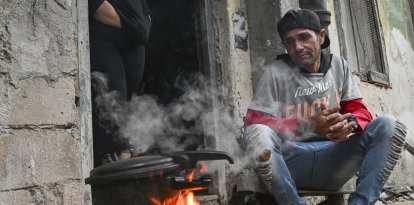Analysis
With Trump and Milei as starting points, freedom advocates gathered in Argentina to discuss the future of the West
Different speakers participated in an event jointly organized by the Faro Foundation (Argentina) and the Center for Fundamental Rights (Hungary).

The Fundación Faro event in Buenos Aires/ Edit from screenshot.
"The Lighthouse of the West: Meeting for Freedom" was a proposal organized by the Faro Foundation (Argentina) and the Center for Fundamental Rights (Hungary) in Buenos Aires, where VOZ was present. Under this slogan, the think tanks brought together an interesting range of speakers from various countries to shape the global context and analyze the future of the West through the lens of freedom ideas.
The chosen venue was the coquettish Yacht Club, located in the Puerto Madero neighborhood. Amidst indistinct conversations, circulating drinks and music that could have been quieter, the attendees prepared for the conference, which was scheduled to start at 6 p.m. local time.
When everyone took their seats, the person in charge of welcoming everyone was Adrián Ravier, the academic director of Faro Foundation, who remarked that the objective of the event was none other than to generate "useful knowledge" to be applied in the battle of ideas.
The second welcome was given by Vajk Vargas, director of the Madrid office of the Center for Fundamental Rights. He began by highlighting the work of President Javier Milei, assuring that the eyes of the world are now on Argentina. "He is rescuing the heart and soul of his country. Only a strong president and a person of faith can defend fundamental values," he added.
At the same time, he was optimistic about the world scenario, assuring that "the winds of freedom and patriotism are once again blowing over the Western world."
An analysis of Trump, Milei and the cultural battle
The first panel of the day began with the moderation of Mariano Pérez, journalist and creator of the YouTube channel Breaking Point, who brought on stage Andrés Martínez Fernández, senior analyst for Latin America at Heritage Foundation; Nicolás Promanzio, defense specialist and political analyst; and Francesco Giubilei, author and president of the Tatarella Foundation.
Breaking the silence, Martinez Fernandez analyzed the first 100 days of the second Trump administration and marked a fundamental difference with the first: "Now he knows Washington and has a team that truly supports his agenda."
He also highlighted the Republican president's efforts to combat bureaucracy within the federal government. "The permanent bureaucracy is poised to resist the processes of change. We need not be ashamed to implement an agenda that was endorsed by the citizens," he added.
Promanzio focused his analysis on Argentina and the change of course brought about by Milei's arrival to power.
The analyst remarked that, in addition to the measures implemented, the libertarian president played a fundamental role in the battle of ideas, since, during his campaigns for Congress and the Casa Rosada. "He made people understand that the cultural battle had to be fought."
Giubilei took and developed points from the previous presentations. He continued Promanzio's line and affirmed that one cannot "win the political battle without winning the cultural battle," recommending that those present read the complete works of Antonio Gramsci, founder of the Italian Communist Party, who developed the concept of "hegemony."
On the other hand, he insisted that one of the problems with many conservative forces when they come to power is that there are many "ideological people inside the government," who work to undermine reforms from within.
"We have to recover the hemisphere"
In the second panel, Eduardo Cader, director of the international area at Fundación Disenso and Foro Madrid, Francisco Faig, author and advisor to Fundación FREE, and Vajk Vargas, director of the Madrid office of the Center for Fundamental Rights, participated.
Cader focused on the role of the Sao Paulo Forum, an organization that "for 30 years has been undermining our democracies and attacking individual freedoms" in Latin America.
He highlighted the weakening of its leaders over the years, except for the current president of Brazil, Lula da Silva: "The rest of its figures today are, in the words of our dear Argentine friend Karina Mariani, 'puppets, demented or convicts'. Just look at the list of who their members are, this is on the Forum's website."
"In short, we have to make lack of a democratic alternative, a transatlantic block of freedom that configures a new regime that includes Milei to Santiago Abascal, Prime Minister (Viktor) Orban, Prime Minister (Giorgia) Meloni, and other natural leaders also in Brazil, Uruguay and Paraguay. It is necessary to recover the hemisphere so that we no longer have people under the course of totalitarianism and the liberticidal projects that represent the course of the socialist international," Cader added.
In addition to highlighting the work of the FREE Foundation in linking the conservative worlds of the United States and Europe with the Río de la Plata, Faig praised the work of President Milei and recalled Argentina's historic role in the region.
"Argentina is, historically, the most important country in South America. That is, capital of the Viceroyalty of La Plata, capital of Buenos Aires, but also fifth power in the world in 1945 at the exit of World War II," he explained.
"It is also a country that continues to be, of reception of so many European and regional immigrants, today as well, and that was the place where to dream and be able to get ahead with freedom, with respect to private property, with a path of one's own (...) That is the great promise that is behind Milei's project when he talks about (Juan Bautista) Alberdi," Faig added.
"The ideas of freedom connect with the most formidable of the human spirit"
Closing remarks were delivered by Axel Kaiser, a popular Chilean author and deputy academic director of the Faro Foundation.
The lecturer also chose a more hopeful tone to end the event, emphasizing the need to encourage public debate, spread the ideas of freedom and "defend them against anyone."
"The ideas of freedom must come first because they connect with the healthiest and most formidable thing that the human spirit has, which is our capacity to dream, that we can be the architects of our own destiny," Kaiser concluded.
























